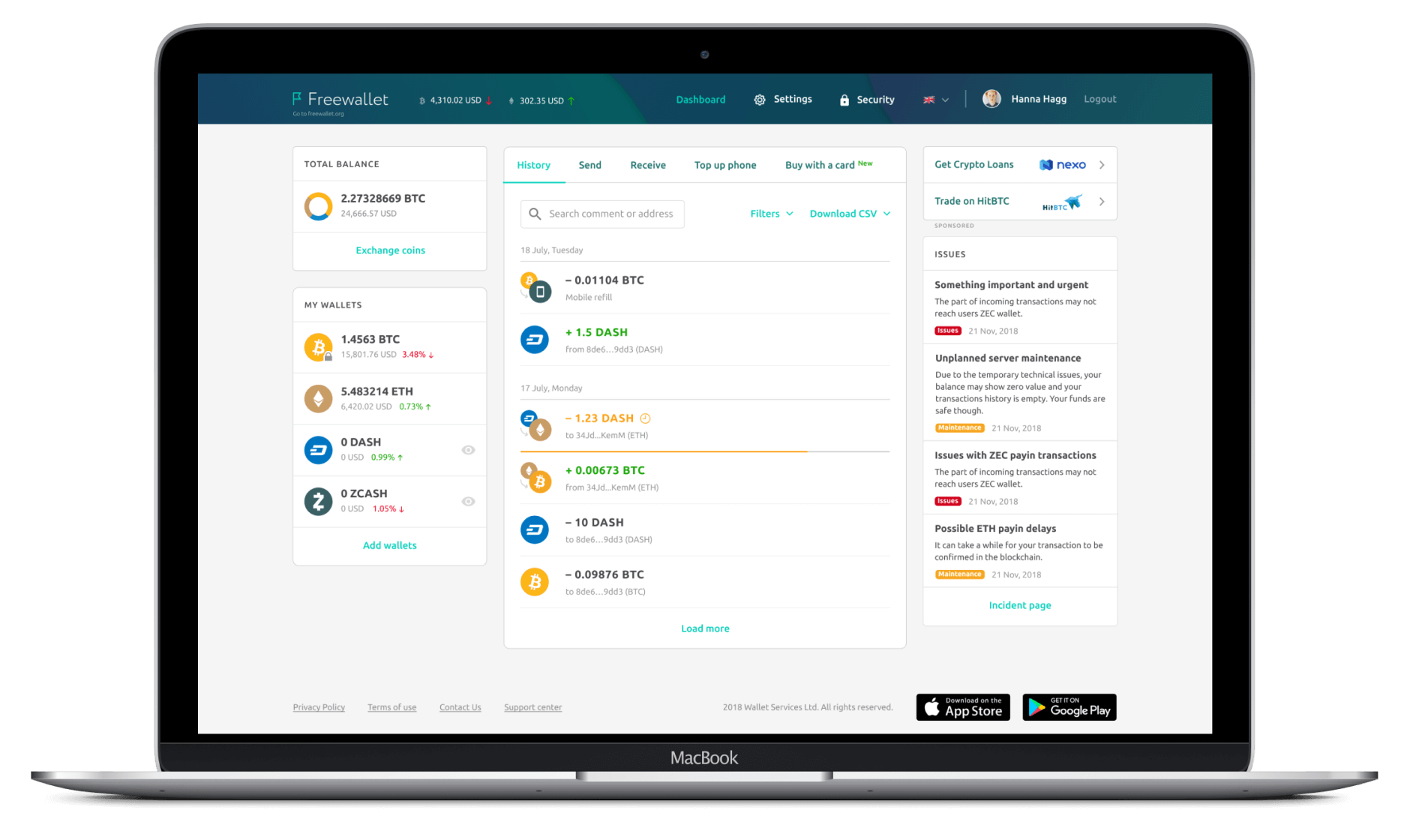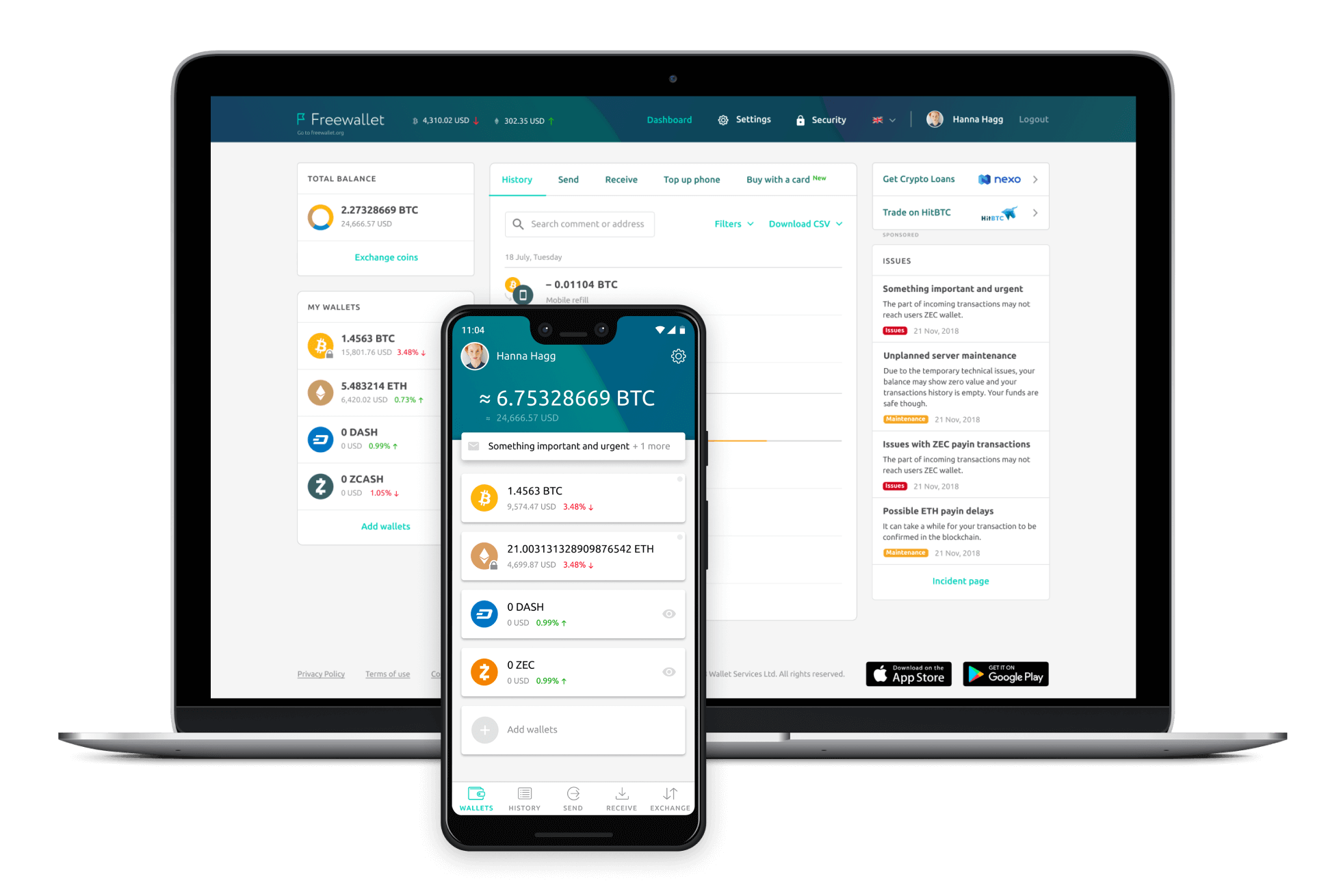
A single code base shared across all platforms brings new features to all platforms at the same time. You can use those dollars, or transfer in new ones, to buy and sell. This type of wallet is called a hierarchical deterministic wallet, or an HD wallet. Other storage platforms act more like wallets to be used repeatedly with a reasonable degree of security.
Types of Wallets
In this guide you will learn the easiest way how to create your first cryptocurrency wallet with the universal Medooza Crypto wallet. Save my name, email, vryptocurrency website in this browser for the next time I comment. Cryptocurrency Wallet how to create a cryptocurrency hardware wallet how to create a cryptocurrency wallet how to create a cryptocurrency wallet app how to web wallet for cryptocurrency a digital wallet for cryptocurrency how to create cryptoocurrency paper wallet for cryptocurrency how to create a private cryptocurrency wallet how to create a virtual wallet for cryptocurrency how to create a wallet for your cryptocurrency how to create an e wallet for crypyocurrency how to create an web wallet for cryptocurrency cryptocurrency wallet how to create an offline wallet for cryptocurrency How to create cryptocurrency wallet how to create cryptocurrency wallet app How to create cryptocurrency wallet Beginners guide how to create cryptocurrency wallet website how cryptoccurrency create my cryptocurrency wallet how to create my own cryptocurrency wallet how to create own cryptocurrency wallet how to create wallet for cryptocurrency how to create your own cryptocurrency wallet. Related Posts. MDZA tokens reached more than 22, holders! July 9,
Let’s help you find a bitcoin wallet.

List of Cryptocurrency Wallets supoporting Cryptonote coins. Desktop, hardware, web and mobile Wallets. Missing wallet? Let us know. Mining Pools Greeting cards! Cryptonote Coins Greeting cards! Swap from Bittorium to Talleo.
Read our comprehensive beginner’s guide to choosing and using crypto wallets.
Last updated: 21 June We value our editorial independence, basing web wallet for cryptocurrency comparison results, content and reviews on objective analysis without bias.
But we may receive compensation when you click links on our site. Learn more about how we make money from our partners. If you want to buy bitcoin or any other digital currency, you must choose a wallet where you can securely store your coins or tokens. Find out how coins are stored on the blockchain and how to store, buy or sell coins in your wallet.
A cryptocurrency wallet is a software program that allows you to store, send and receive digital currencies. Some cryptocurrencies offer their own official wallets, while other products allow you to store multiple currencies within the same wallet. Instead of holding physical coins, a crypto wallet is electronic and includes a public and private key. As well as storing your public and private keys, crypto wallets interface with the blockchains of various currencies so that you can check your balance and send and receive funds.
The blockchain of any cryptocurrency contains a public record of all the transactions made since it began. Your wallet address keeps a record of all your transactions, and therefore also tracks your crypto balance.
By following the chain to today, a wallet can figure out how many coins you. See it for yourself: Watch bitcoin transactions happen in real time. Desktop Easy to use Secure Plenty of choices Free to download Risk of computer viruses and malware Inconvenient to manage your crypto on the go The most common type of wallet out there, desktop wallets are downloaded and installed on your computer.
Easy to set up and maintain, most are available for Windows, Linux and Mac, although some are limited to a particular operating. Many cryptocurrencies offer a desktop wallet specifically designed for its coin. The biggest disadvantage is that they also rely on you to keep your computer secure and free of malware, so antivirus and -malware software, a strong firewall and a common-sense approach to security are required to keep your coins safe.
Most desktop wallets provide you with a long string of words to install. Mobile wallets are fairly similar to desktop wallets, but they run as an app on your smartphone. Mobile wallets feature many of the same advantages and disadvantages as desktop wallets, with your private key stored on your device. Smartphone wallets are often easier to use than desktop wallets. Mobile wallets have the benefit of scanning other wallet addresses for faster transactions.
They also make it simpler to access your coins on the go to make using cryptocurrency part of your everyday life.
Take care to not lose your smartphone. Choosing an app that allows you to back up your wallet with a or word passphrase is a good idea. Most only require an email address and a password to create an account, and web wallets are usually designed to provide a simple and straightforward user experience.
Because some platforms maintain wallets for thousands of users, they can become hot targets for hackers. Hardware wallets add another layer of security by keeping your private key on a USB stick or specially designed piece of hardware.
They allow the user to plug the USB stick into any computer, log in, transact and unplug. So while transactions are carried out online, your private key is stored offline and protected against the risk of hacking. As a result, hardware wallets are considered the most secure storage option. If you lose your hardware wallet, the device is protected by a PIN and typically other protective measures in place to help you recover your funds.
Paper wallets take to the next logical step the concept of entirely offline keys for hardware wallets: simply print out your public and private keys and use that piece of paper as your wallet.
As secure as they are, paper wallets are also complex and can be confusing for beginners. To transfer money to a paper wallet, you use a software wallet to send money to the public key printed on the sheet of paper.
Most often, this is printed as a QR code for easy scanning. To transfer money from the paper wallet to someone else, first transfer money to a software wallet by manually entering the private key into the software, and then transfer money from the software wallet to the recipient as usual. This quick, convenient solution provides fast access to your crypto whenever you need it. With this in mind, the safest solution is moving your coins into a secure wallet that lets you retain control of your private key.
To choose the right wallet for you, consider your needs and compare wallets based on key factors that include:. Compare cryptocurrency wallets. These addresses are either:. Note that the exact process varies depending on the brand of wallet you choose. For example, hardware wallet users typically need to connect their wallet device, enter a PIN or password and manually verify the transaction on the device. Receiving coins is even easier than sending.
However, wallets vary in how they receive. Some provide you with a fixed public address, some give you a new address for every transaction and others provide a combination of the two.
Log in to your wallet whenever you want to check your balances. You can earn interest on some currencies by staking your holdings, though there may be specific instructions in your wallet to do.
Wallet security is crucial for any crypto owner, so keep these tips in mind to keep your funds as safe as possible:. Used by the most secure and trustworthy wallets, two-factor authentication requires a regular username and password combination and another authentication method. This means that an attacker would need to know your username and password and also have your phone. Some wallets require you to install a secondary app on your smartphone that generates these PIN codes for you, adding another layer of security.
The right wallet for you is the one that matches your needs. If security is your No. Do your research and compare wallets. If anonymity is important to you, consider transacting with a privacy-focused coin like Monero. Do cryptocurrency wallets charge fees? Sending a cryptocurrency transaction from your wallet usually costs a small network fee that varies depending on the currency you send. Can I store all my cryptocurrencies in the same wallet?
It depends on the cryptocurrencies you own and the wallet you choose. Some wallets allow you to store only one specific cryptocurrency, while multicurrency wallets support any number of digital currencies. Which cryptocurrency wallet is the best? To narrow down your choices, ask yourself:. What is the best bitcoin wallet?
Check out our guide to the best bitcoin wallets for a rundown of 15 popular bitcoin-compatible wallets. What is the best Ethereum wallet? Take a look at our guide to some of the best Ethereum wallets for more information on how to choose an ETH wallet.
What is the best XRP wallet? Can I send bitcoin to an Ethereum wallet address or vice versa? Funds sent to the wrong address generally cannot be recovered.
What is a light client — and what does it have to do with wallets? Light clients only synchronize essential information and fetch additional data from the network when required. Most mobile wallets are light clients, while you can also download desktop light clients. Tim Falk is a freelance writer for Finder, writing across a diverse range of topics.
Over the course of his year writing career, Tim has reported on everything from travel and personal finance to pets and TV soap operas.
Optional, only if you want us to follow up with you. Our goal is to create the best possible product, and your thoughts, ideas and suggestions play a major role in helping us identify opportunities to improve.
While we are independent, the offers that appear on this site are from companies from which finder. We may receive compensation from our partners for placement of their products or services. We may also receive compensation if you click on certain links posted on our site. While compensation arrangements may affect the order, position or placement of product information, it doesn’t influence our assessment of those products.
Please don’t interpret the order in which products appear on our Site as any endorsement or recommendation from us. Please appreciate that there may be other options available to you than the products, providers or services covered by our service.
Crypto Finder: Buy, sell or exchange cryptocurrency. Tim Falk. Compare wallets Learn. What is the blockchain? Bitcoin alternatives Mining. Disclaimer: This information should not be interpreted as an endorsement of cryptocurrency or any specific provider, service or offering. It is not a recommendation to trade. Go to site More Info. Ledger Nano S Wallet. Securely store some of the world’s leading cryptocurrencies on the Ledger Nano S hardware wallet. Atomic Wallet. Desktop Client. Abra Cryptocurrency App.
Corazon Wallet.
The Best Wallets To Store Bitcoin & Cryptocurrencies For Beginners
Local Wallets
Both of these processes physically change the drive. Although they offer the lowest level of security, online bitcoin wallets have the advantage of being accessible from any internet connected device. Light clients only synchronize essential information and cyptocurrency additional data from the network when required. How wallets and blockchains interact The blockchain of any cryptocurrency contains a public record of all the transactions made since it began. As with many other Bitcoin technologies, the option to dirty your own cryptocurgency is always open. Not really. Ledger Nano S. Don’t store coins on exchanges! Electrum is wa,let light weight Bitcoin wallet for Mac, Linux, and Windows. Whereas an OpenDime unit can be web wallet for cryptocurrency extremely securely as an address to store Bitcoins until the owner web wallet for cryptocurrency to cash out, but only. However, even offline wallets can be breached, meaning that security in the Bitcoin world depends largely on following good practices.
Комментарии
Отправить комментарий